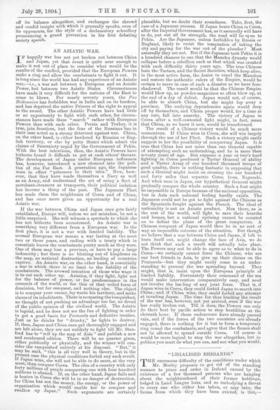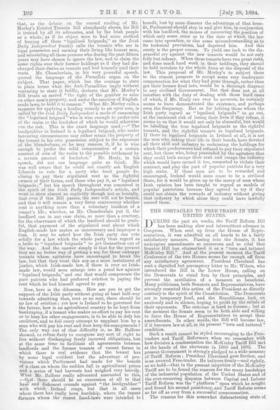" LEGALISED BRIGANDS." T HE enormous difficulty of the conditions under
which Mr. Morley proposes to get rid of the standing menace to peace and order in Ireland caused by the existence of a few thousand persons who are hanging about the neighbourhood of their former holdings, lodged in Land League huts, and so embodying a threat to every one who either has taken, or may take, the farms from which they have been evicted, is this,— that, as the debate on the second reading of Mr. Morley's Evicted Tenants Bill abundantly shows, his Bill is treated by all its advocates, and by the Irish people as a whole, as if its object were to find some method of buying off those "legalised brigands," as the Irish _Daily Independent frankly calls the tenants who are in legal possession and earning their living like honest men, and reinstating all those persons who during the past fifteen years may have chosen to ignore the law, and to claim the same rights over their former holdings as if they had dis- charged their duties as tenants and had honestly paid their rents. Mr. Chamberlain, in his very powerful speech, quoted the language of the Parnellite organ on the subject. That paper, which has the courage to state in plain terms what the Anti-Parnellites imply without venturing to state it boldly, declares that Mr. Morley's Bill treats as sacred the right of the grabber to seize on other men's property, and under the sanction of English- made laws, to hold it to ransom." What Mr. Morley calls a measure for applying a healing remedy to an open sore, is called by the Irish Daily Independent a mode of ransoming the "legalised brigand "who who is wise enough to prefer coin of the realm to the buckshot of which he would otherwise run the risk. This is the exact language used :—" The landgrabber in Ireland is a legalised brigand, who under favouring circumstances may either retain the property of the tenant in his own possession subject to the argument of the blunderbuss, or he may ransom it, if he is wise enough to prefer the solid compensation of a certain amount of coin of the realm to the possible settlement by a certain amount of buckshot." Mr. Healy, in his speech, did not use language quite so frank. He was well aware that he could not exactly ask English Liberals to vote for a party who treat people de- clining to pay their stipulated rent as the rightful owners of their farms, and those who pay it, as " legalised brigands ;'t but his speech throughout was conceived in the spirit of the Irish Daily Independent's article, and went to show almost as explicitly though not so brutally, that even if this Bill passes, the sore will not be healed, -and that it will remain a very fierce controversy whether rent is anything more than a voluntary incident of a tenant's life ; whether, as Mr. Chamberlain put it, the landlord can in any case claim, as more than a courtesy, for the observance of which the landlord should be grate- ful, that payment of the stipulated rent about which English-made law makes so unnecessary and improper a fuss. It may be asked how the Irish party can vote solidly for a law which the whole party thus regard as a bribe to " legalised brigands " to get themselves out of the way. And the answer simply is that for the present they see no better way of getting a, sop for those unhappy tenants whom agitators have encouraged to break the law, but that they treat this sop as a mere instalment of justice, which Irish-made law, if there is ever an Irish- made law, would soon enlarge into a penal law against legalised brigands," and one that would compensate the pure patriots who had preferred eviction to paying the rent which he had himself agreed to pay.
Now, here is the dilemma. How are you to get the support of the Irish party without going at least half-way towards admitting that, rent or no rent, there should be no law of eviction ; yet how is Ireland to be governed for the future, how is an agricultural country to be kept from bankruptcy, if a, tenant who makes no effort to pay his rent or to keep his other engagements, is to be able to defy his creditors, and to foil every attempt to supplant him by a man who will pay his rent and does keep his engagements ? The only way out of that difficulty is, as Mr. Balfour showed, to refuse flatly to recognise any sort of right to live without discharging freely incurred obligations, but at the same time to facilitate all agreements between landlords and the former tenants of vacant farms in which there is real evidence that the tenant has by some legal accident lost the advantage of pro- visions which Parliament had made for the benefit of a class on whom the sudden fall in agricultural prices and a series of bad harvests had weighed very heavily. What Mr. Balfour really advocated amounted to this, --t! 2t there should be no concession at all to that bag and dishonest crusade against " the landgrabber " with which Ireland rings, but that in all cases where there has really been hardship, where the tenant farmers whom the recent Land-laws were intended to benefit, lost by mere disaster the advantage of that bene- fit, Parliament should step in and give him, in conjunction with his landlord, the means of recovering the position of which only some error as to the date at which the law came into operation, or else some misunderstanding as to its technical provisions, had deprived him. And this surely is the proper course. To yield one inch to the dis- graceful cry against the new tenants would be not only folly but infamy. When these tenants have run great risks, and done much hard work in their holdings, they should be held inviolate by the whole force at the disposal of the law. This proposal of Mr. Morley's to subject them to the utmost pressure to accept some very inadequate compensation for what they had gone through, rather than get their houses fired into, would be a. thorough disgrace to any civilised Government. But that does not at all interfere with the duty of dealing with those hard cases of which, if Mr. Healy can ever be accurate, he certainly seems to have demonstrated the existence, and perhaps even the frequency. But as for bribing those whom the Irish party regard as " legalised brigands " to go out, at the imminent risk of losing their lives if they refuse, it seems to us that it would not only be shameful, but would be labelling the true legalised brigands as the rightful tenants, and the rightful tenants as legalised brigands. If there be legalised brigands in Ireland at all, it is not the men who, taking their life in their hands, have devoted all their skill and industry to reclaiming the holdings for which their predecessors had refused to pay their stipulated rent, but those who, being persuaded by the agitators that they could both escape their rent and escape the industry which would have earned it too, consented to violate their contract, and play the part of popular patriots for a very high stake. If these men are to be rewarded and encouraged, Ireland would soon cease to be a civilised State, for it would be given up to the mercy of men whom Irish opinion has been taught to regard as models of popular patriotism because they agreed to try if they could not obtain the rewards of industry without giving that industry by which alone they could have lawfully earned them.



































 Previous page
Previous page